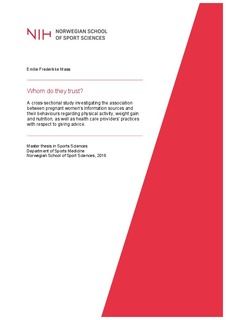| dc.description.abstract | BACKGROUND: To date, there is limited evidence investigating pregnant women’s information sources regarding physical activity (PA), gestational weight gain (GWG) and nutrition at late gestation. Further, no studies have examined the impact of different information sources on pregnant women’s health behaviours. There is also a lack of data on whether health care providers in Norway give advice on these topics to their pregnant patients. Hence, this study were three folded: (1) investigate the main information sources among pregnant women regarding PA, GWG and nutrition, (2) evaluate how these information sources may affect their health behaviours and (3) examine the extent of provider advice on these topics. METHODS: The project was a cross-sectional study conducted in Oslo, Norway, from February to August 2016. With respect to the different aims of the study, the data collection was divided into two parts. In part A, pregnant women (n=150) answered an electronic questionnaire investigating their health behaviours, as well as their information sources regarding PA, GWG and nutrition. In part B, health care providers (n=14) answered a postal survey with the aim to explore their beliefs and practices regarding maternal exercise, GWG and nutritional recommendations. MAIN RESULTS: Media and Internet were the most frequently used sources of information, reported by 30% of the women. Stating media and Internet as their most important information source, was associated with increased odds of gaining weight below the IOM guidelines (p = 0.02) and higher adherence to nutritional recommendations (p = 0.03). Choosing friends and family was associated with gaining above the IOM guidelines (p = 0.03). No other associations were found between information sources and health behaviours. Twelve out of 14 providers reported giving advice on all three topics to their pregnant patients. Three out of 14 providers gave advice consistent with the ACOG PA and exercise recommendations and four out of 14 gave advice consistent with the IOM weight gain recommendations. CONCLUSION: The majority of women reported retrieving health advice through media and Internet sources. Media and Internet sources seemed to have a positive impact on nutritional behaviour, however, they were also associated with gaining below the IOM guidelines. Receiving advice from friends and family was associated with gaining above the guidelines. Most providers gave health advice to their pregnant patients. However, few gave advice consistent with the guidelines for PA and GWG. | nb_NO |
